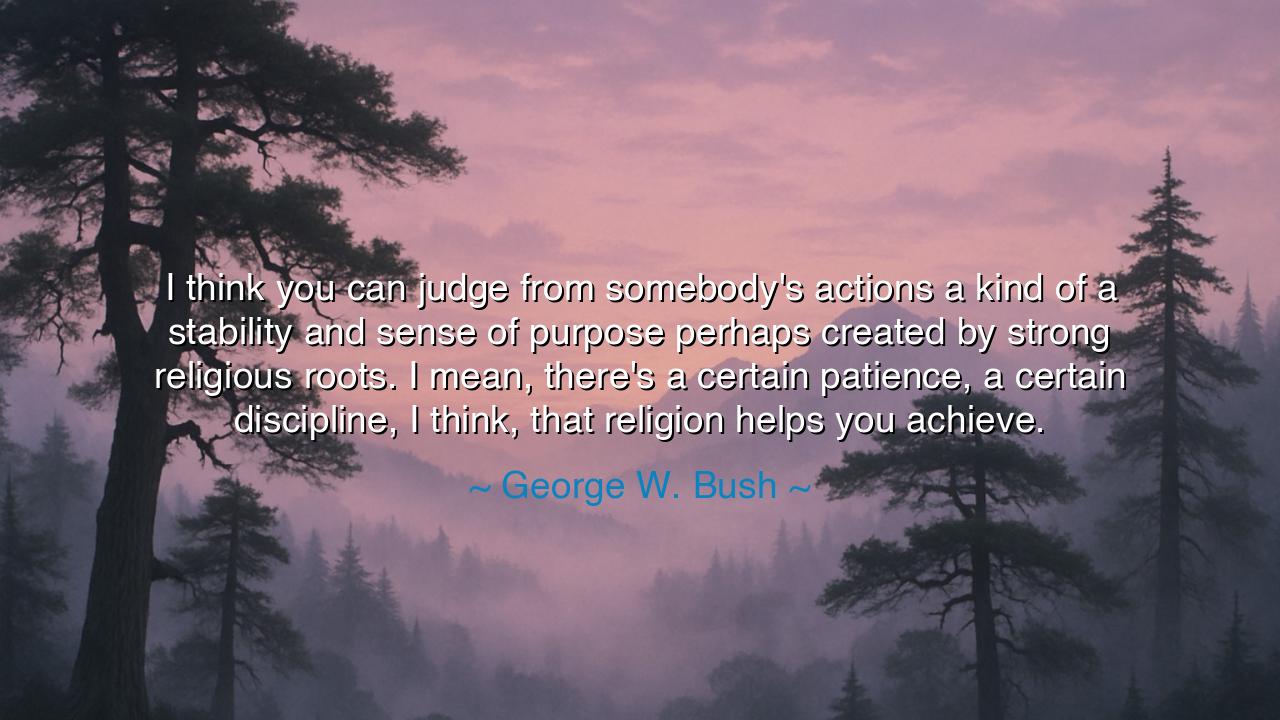
I think you can judge from somebody's actions a kind of a
I think you can judge from somebody's actions a kind of a stability and sense of purpose perhaps created by strong religious roots. I mean, there's a certain patience, a certain discipline, I think, that religion helps you achieve.






“I think you can judge from somebody’s actions a kind of stability and sense of purpose perhaps created by strong religious roots. I mean, there’s a certain patience, a certain discipline, I think, that religion helps you achieve.” Thus spoke George W. Bush, a man shaped by faith, family, and the weight of leadership. In these words lies not a boast of belief, but a reflection — a recognition that faith, when true and lived sincerely, is not merely a matter of creed, but of character. Religion, to Bush, is not a banner waved before men, but a deep river that carves patience, humility, and discipline into the stone of the human soul.
In this saying, Bush reminds us that belief is proven not by words, but by deeds. The man or woman rooted in faith walks differently: with calm when others panic, with strength when others falter, with compassion when others harden their hearts. Such stability does not spring from mere willpower — it is born from an anchor deeper than the self. It is the quiet assurance that life, though unpredictable and often cruel, unfolds under the watchful hand of divine purpose.
Bush himself was no stranger to struggle. In his early years, he wrestled with pride, restlessness, and self-doubt. Yet when faith entered his life, it brought clarity — not perfection, but direction. It taught him patience when storms raged, and restraint when power tempted. From that transformation came this insight: that true religious roots do not make a person flawless, but steady. They teach one to endure rather than to escape, to trust rather than to despair. They shape the heart to act, not from impulse, but from conviction.
We may see this truth echoed in the story of Nelson Mandela, a man not defined by religion in doctrine, but by the spiritual strength that such roots produce. In his 27 years of imprisonment, he endured injustice with grace, never surrendering to hatred. He emerged not bitter, but reconciled — his patience forged through inner faith in something greater than himself. His discipline was not born from ambition, but from spiritual endurance. As Bush’s words suggest, such steadiness comes only from a life anchored in a deeper moral foundation, one that religion — rightly lived — helps cultivate.
Faith, in its pure form, is not fanaticism. It is balance. It does not cry for domination but for service; it does not seek to control but to uplift. It teaches man to bow before mystery, to labor faithfully, to love without ceasing. From such a spirit arises discipline — the discipline to master one’s temper, to choose truth over ease, to act with justice even when unseen. Religion teaches not only how to pray, but how to persevere. It whispers to the weary heart, “Endure, for meaning lies beyond the pain.”
Bush’s reflection, though spoken in modern times, carries the wisdom of the ancients. For even the philosophers of Greece and Rome saw that virtue requires training, and that faith — whatever its name — provides the soil in which virtue grows. The Stoic found peace in reason; the Christian in grace; the Buddhist in detachment. All saw that without an inner compass, the soul drifts like a ship in storm. Religious roots give that compass, reminding man that he is both dust and divine breath — fragile, yet capable of greatness.
So, O seeker of understanding, take this to heart: stability is not born of comfort, but of conviction. To find purpose, you must first find your root — that source which reminds you who you are and what you serve. Whether through prayer, meditation, or quiet reflection, let your spirit drink from the well of the eternal. Practice patience in hardship, and discipline in daily life. Let your faith — however humble — shape your actions until others can see in you what Bush saw in the truly grounded: a steadiness that the world cannot shake.
For in the end, as Bush’s words reveal, religion’s truest gift is not certainty, but strength — not pride, but peace. The storms of life will come for all, but the one who stands upon faith, who walks with discipline and endures with patience, shall remain unmoved, like the tree whose roots reach the waters of the divine.






AAdministratorAdministrator
Welcome, honored guests. Please leave a comment, we will respond soon